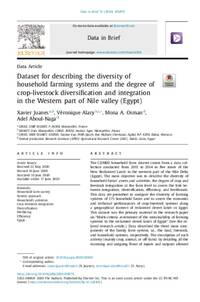Dataset for describing the diversity of household farming systems and the degree of crop-livestock diversification and integration in the Western part of Nile valley (Egypt)

Authors:
The CLIMED household farm dataset comes from a data collection conducted from 2013 to 2014 in five zones of the New Reclaimed Lands in the western part of the Nile Delta (Egypt). The main objective was to describe the diversity of household farms’ assets and activities, the degree of crop and livestock integration at the farm level to assess the link between integration, diversification, efficiency, and livelihoods. This data set permitted to compare the diversity of farming systems of 175 household farms and to assess the economic and technical performances of crop-livestock systems along a geographical transect of reclaimed desert lands in Egypt. This dataset was the primary material in the research paper on “Multi-criteria assessment of the sustainability of farming systems in the reclaimed desert lands of Egypt” (See the related research article.). Data described the three main components of the family farm system, i.e., the land, livestock, and household systems, respectively. The description of each activity (mainly crop, animal, or off-farm) by detailing all the incoming and outgoing flows of inputs and outputs allowed investigating the economic and financial contribution of each activity and the degree of dependence or complementarity between them. The dataset provided two tables of analyzed data related to, respectively, ‘diversification and integration’ and ‘efficiency and wellbeing.’ Moreover, this dataset constitutes an original material regarding the living conditions and farm functioning in the new lands reclaimed over the last 50 years in Egypt. The survey data were entered into an Access database, checked with statistical cross-checking variables, and completed by field return for missed or non-coherent data.
